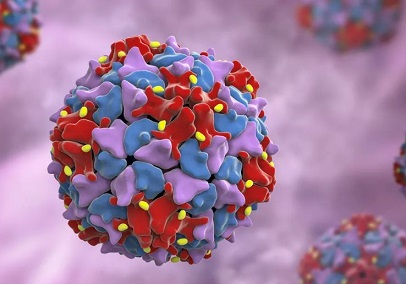Australian Infectious Diseases Specialist Warns That Hundreds Could Be Infected With Polio In Indonesia And That The Situation Is Worrisome
Nikhil Prasad Fact checked by:Thailand Medical News Team Jan 21, 2024 1 year, 3 months, 3 days, 8 hours, 51 minutes ago
Medical News: In a shocking turn of events, Indonesia, declared polio-free by the World Health Organization (WHO) a decade ago, is now facing a resurgence of the debilitating disease. The outbreak, centered in the East Java province, has prompted an urgent response from health authorities and experts. Infectious diseases specialist Professor Robert Booy warns that the situation is more alarming than initially reported, estimating around 200 cases of polio in the region. This unexpected resurgence is attributed to a mutated strain of the polio vaccine circulating in the community, posing a heightened risk to human health.
https://www.skynews.com.au/world-news/global-affairs/probably-200-cases-of-polio-in-east-java-outbreak-infectious-diseases-specialist/video/4dfbbd2887896f3ff5aa78da92c2fca9
 Hundreds Could Be Infected With Polio In Indonesia
Outbreak Details
Hundreds Could Be Infected With Polio In Indonesia
Outbreak Details
According to latest local
Medical News coverage on the situation, three children in East Java and Central Java were reported to be suffering from acute flaccid paralysis (AFP) caused by Polio Virus Type 2. In addition, from lab results in the area around them there were nine other children who tested positive even though they did not show symptoms. The East Java Provincial Health Office said that wo of the children are currently in ICU.
https://voi.id/bernas/349497/kasus-klb-polio-indonesia-tak-boleh-terlena-meskipun-sudah-dinyatakan-bebas-penyakit-lumpuh-layu
The outbreak is primarily attributed to the circulating vaccine-derived poliovirus type 2 (cVDPV2).
The WHO's Disease Outbreak News reveals that Indonesia reported four cVDPV2 cases from October 2022 to February 2023. Recent cases in December 2023 involved a 6-year-old female and a one-year-old male from Central Java and East Java, respectively, both having a history of recent travel to polio-affected areas.
https://www.who.int/emergencies/disease-outbreak-news/item/2024-DON500
Vaccine Mutation and Risk Factors
The mutation of the polio vaccine used in the affected regions is identified as a significant factor contributing to the outbreak. The mutated vaccine has taken on a more dangerous form, leading to increased transmission and the emergence of symptomatic cases. Sub-optimal vaccination coverage in various districts, with percentages below the recommended levels, has heightened the risk of further transmission and impact on human health.
Sociocultural Barriers and Challenges
While the region does not have hard-to-reach areas, sociocultura
l barriers, especially in East Java's Madura community, present challenges to vaccination efforts. Vaccine hesitancy rooted in fear of adverse effects, multiple injections, and religious reasons has hindered the immunization drive. The complex sociocultural landscape has played a role in the resurgence of a disease once thought to be eradicated.
Epidemiology and Transmission
Polio, a highly infectious disease primarily affecting children under five, can cause permanent paralysis or death. The virus spreads through the fecal-oral route, contaminated water, or food. With an incubation period of 7-10 days, the disease often goes unrecognized, with up to 90% of infected individuals either asymptomatic or experiencing mild symptoms. Vaccine-derived poliovirus, resulting from the mutation of the oral polio vaccine (OPV), can circulate in communities with low vaccination coverage.
Public Health Response
In response to the cVDPV2 outbreak, extensive public health measures are underway. Case investigations, risk assessments, and active case finding in affected households are ongoing. Coordination with the global polio eradication initiative is crucial, and efforts to enhance routine immunizations, especially with inactivated polio vaccine (IPV), are in progress. The release of novel oral polio vaccine type 2 (nOPV2) has been approved to conduct supplementary immunization activities (SIAs) to curb the outbreak.
WHO Risk Assessment and Recommendations
The WHO assesses the overall risk as high at the national level, acknowledging Indonesia's strong response capacity. However, susceptibility to type 2 polioviruses due to the switch from trivalent OPV to bivalent OPV and sub-optimal IPV vaccination coverage raises concerns. The international risk is deemed moderate, emphasizing the need for heightened surveillance and cooperation across borders.
https://www.who.int/emergencies/disease-outbreak-news/item/2024-DON500
Local Impact and Government Response
Almost a dozen cases have been detected in East Java, prompting the government to declare Extraordinary Event (KLB) status to prevent further spread. National Immunization Weeks (PIN) have been initiated in Central Java, East Java, and Yogyakarta to vaccinate children aged 0-7 years, regardless of previous immunization status. The importance of maintaining high vaccination coverage and addressing public awareness and hesitancy is emphasized.
Factors Contributing to the Outbreak
Low coverage of polio vaccines, exacerbated by the COVID-19 pandemic disrupting immunization schedules, is a critical concern. Misinformation regarding vaccine safety and the belief that polio has been eradicated contribute to hesitancy. Collaborative efforts between health workers, community leaders, the media, and the government are essential to educate the public, improve hygiene practices, and address the current outbreak.
https://turnbackhoax.id/2024/01/21/salah-kemenkes-membahayakan-anak-anak-indonesia-dengan-pemberian-vaksin-polio/
https://jatim.jpnn.com/jatim-terkini/27463/urgensi-sosialisasi-vaksin-polio-pakar-komunikasi-kesehatan-bilang-begini
https://katadata.co.id/dinipramita/analisisdata/65a8f395a659d/di-balik-alarm-bahaya-wabah-polio-di-indonesia
https://beritajatim.com/politik-pemerintahan/indonesia-klb-polio-atikoh-ganjar-mahfud-siap-berantas-polio/
Conclusion
The unexpected resurgence of polio in Indonesia, despite a decade of being declared polio-free, underscores the importance of robust vaccination programs, surveillance, and public awareness. Urgent measures are needed to contain the outbreak, including enhanced vaccination efforts, addressing sociocultural barriers, and international cooperation. The global community must remain vigilant and support Indonesia in its fight against this resurgent public health threat.
For the latest
Medical News, keep on logging to Thailand Medical News.
